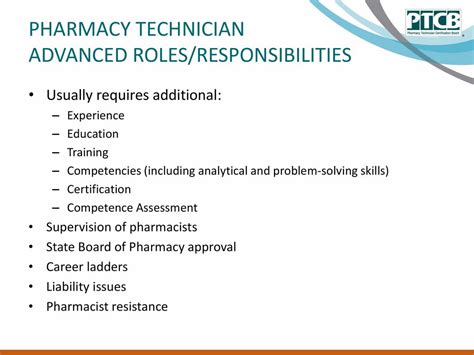Pharmacy technicians play a vital role in the healthcare industry, working closely with pharmacists to ensure the safe and effective delivery of medications to patients. As the demand for healthcare services continues to grow, the role of pharmacy technicians is evolving to meet the changing needs of the industry. In this article, we will explore the advanced roles and responsibilities of pharmacy technicians, including their scope of practice, skills, and knowledge required to excel in these roles.
The Evolution of Pharmacy Technicians
Pharmacy technicians have come a long way since their early days as pharmacy assistants. Today, they are an integral part of the pharmacy team, working alongside pharmacists to provide patient care services, manage medication therapy, and maintain accurate records. The increasing complexity of pharmacy practice has created a need for more advanced roles and responsibilities for pharmacy technicians.
Advanced Roles of Pharmacy Technicians
Pharmacy technicians are taking on more advanced roles in various settings, including hospitals, clinics, community pharmacies, and research institutions. Some of the advanced roles of pharmacy technicians include:
1. Medication Therapy Management (MTM)
Pharmacy technicians are involved in MTM services, working with pharmacists to review patients' medication regimens, identify potential issues, and provide education on proper medication use. They may also assist with medication reconciliation, ensuring that patients' medication lists are accurate and up-to-date.
2. Clinical Trials
Pharmacy technicians play a crucial role in clinical trials, assisting with study coordination, data collection, and medication management. They may also be involved in preparing and dispensing investigational medications, as well as monitoring patient outcomes.
3. Patient Education
Pharmacy technicians are increasingly involved in patient education, providing patients with information on medication use, side effects, and potential interactions. They may also assist with counseling patients on disease management and healthy lifestyle choices.
4. Research and Development
Pharmacy technicians may be involved in research and development activities, assisting with study design, data collection, and data analysis. They may also be involved in the development of new medications, medical devices, and other healthcare products.
5. Leadership and Management
Experienced pharmacy technicians may take on leadership and management roles, overseeing teams of technicians, coordinating workflow, and ensuring compliance with regulations and standards.
Skills and Knowledge Required
To excel in advanced roles, pharmacy technicians require a range of skills and knowledge, including:
- Strong communication and interpersonal skills
- Ability to work independently and as part of a team
- Excellent organizational and time management skills
- Strong analytical and problem-solving skills
- Knowledge of pharmacy operations, laws, and regulations
- Understanding of medication therapy management principles
- Familiarity with electronic health records (EHRs) and other technology systems
Education and Training
Pharmacy technicians can acquire the necessary skills and knowledge through formal education and training programs. Many community colleges, vocational schools, and universities offer pharmacy technician training programs, which typically include coursework, clinical rotations, and internships.
In addition to formal education, pharmacy technicians can also obtain certification through professional organizations, such as the Pharmacy Technician Certification Board (PTCB) or the National Healthcareer Association (NHA). Certification demonstrates a level of expertise and commitment to the profession.
Professional Development
To stay current with advances in pharmacy practice, pharmacy technicians must engage in ongoing professional development activities, such as:
- Attending conferences and workshops
- Participating in online courses and webinars
- Reading industry publications and research studies
- Joining professional organizations and networking with peers

Challenges and Opportunities
Pharmacy technicians face a range of challenges, including:
- Maintaining patient confidentiality and data security
- Managing complex medication regimens and potential interactions
- Staying current with advances in pharmacy practice and technology
- Navigating changing regulatory requirements and standards
Despite these challenges, pharmacy technicians have numerous opportunities for growth and development, including:
- Advancing to leadership and management roles
- Specializing in specific areas, such as pediatrics or oncology
- Pursuing certification and professional development opportunities
- Contributing to research and development activities
Future Directions
The role of pharmacy technicians will continue to evolve as the healthcare industry responds to changing patient needs and advances in technology. Future directions for pharmacy technicians may include:
- Increased involvement in telehealth and virtual patient care services
- Expanded roles in medication therapy management and patient education
- Greater emphasis on interprofessional collaboration and teamwork
- Growing demand for specialized skills, such as compounding and sterile preparation






We invite you to share your thoughts on the evolving role of pharmacy technicians. How do you see the profession changing in the future? What skills and knowledge do you think will be essential for success? Join the conversation by commenting below.
What is the typical salary range for pharmacy technicians?
+The typical salary range for pharmacy technicians varies depending on location, experience, and employer. According to the Bureau of Labor Statistics, the median annual salary for pharmacy technicians was $34,860 in May 2020.
Do pharmacy technicians need to be certified?
+Certification is not always required, but it is highly recommended. Certification demonstrates a level of expertise and commitment to the profession, and may be preferred by employers.
What are the typical duties of a pharmacy technician?
+Pharmacy technicians are responsible for a range of duties, including filling prescriptions, managing inventory, and providing patient education. They may also be involved in medication therapy management, clinical trials, and research and development activities.
